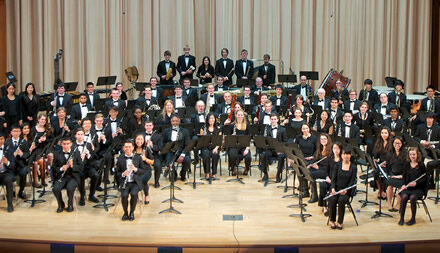There were two stars of the latest concert by the Raleigh Symphony. The first was Eswanti (“land of the Swazis”) baritone Thandolwethu Mamba, who appeared for the first time with orchestra, in Mahler’s Lieder eines fahrenden Gesellen (Songs of a Wayfarer), in Jones Auditorium, having won this year’s Rising Stars competition. We met him late last year and noted with keen interest the words of his Duke teacher, Susan Dunn, and her colleague, the distinguished accompanist and coach David Heid, who avowed that this young singer is among the very finest undergraduate students they have ever heard. RSO music director and conductor Jim Waddelow said much the same thing prior to the baritone’s performance. We were primed. And we were impressed!
He has a magnificent voice, already mature beyond his years. His diction is immaculate, his projection of the German texts (Mahler’s own poems) is breathtaking, and his artistry is comparable to the best world-class singers many times his age. As someone said, this guy can sing, and we were richly rewarded by this deeply moving performance. I will say without hesitation that we are certain to hear much, much more from him.
There were no texts or translations – readers may view them here – but Waddelow’s program notes constituted a significant essay on the cycle and there can have been few people who failed to follow the emotional nuances of the songs. The pacing was virtually ideal, the partnership, supremely fine – reflecting the conductor’s keen sensitivity to his young guest singer. At the end, the audience responded rapturously.* Great great music. Great great singing.
The other star of the evening was the orchestra, whose members seemed truly inspired while partnering Mamba in the Mahler but who shone with considerable brilliance in the rest of the program, too – music surely not under the fingers of very many of the players, if any. The concert opened with Beethoven’s rarely-heard “King Stephen” Overture, Op. 117 (the king being the founder of Hungary, in 1000), marking the 250th anniversary of that composer’s birth. The strings in particular dug into this score, supported of course by the other sections. Next up was Haydn’s Symphony No. 21, stylistically and in terms of its format a throwback to even earlier music as “The Father of the Symphony” honed his compositional skills. This was a test for the orchestra, for music from this period generally sports exposed passages that can cull sheep from instrumental goats, as it were: these folks were up to the challenge and seemed to be having a great time, too. After intermission, there was a rare – and most welcome! – performance of one of Respighi’s great tone poems from the so-called “Roman Trilogy” – in this instance Fountains of Rome, which depicts in music four landmarks at different times of the day. (We’ll link to them below so readers may see pictures of them.) This reading was, like the others, very special, with the orchestra beautifully projecting the varying atmospheres of these iconic fountains. And here, especially, the winds and brass had a grand old time, justly deserving the recognition they were accorded. Another rehearsal or two might have made a little difference here and there, but the ongoing, long-term delight of this orchestra – a treasure in our midst – is the sheer love with which they make music, and that love was apparent in everything they took up on this splendid occasion. So to those who weren’t there, I say: Go hear ’em and support ’em – you won’t be disappointed.
For the record, this was the second major event of the week in the capital that was poorly attended. What gives? Surely there is not too much going on?!
Readers may hear the baritone again at Duke, at his senior recital, on April 11 at 2:00 PM in the Nelson Music Room. The program includes the Mahler, with piano, plus Ravel’s Don Quichotte à Dulcinée, selections from Vaughan Williams’ Songs of Travel, and music by Handel and others. David Heid accompanies.
And the next full RSO concert is May 2, for details of which, click here.
*The third song, “Ich hab’ ein glühend Messer” (I Have a Gleaming Knife), was for years used by this critic’s father in a long-running NCSU course on the history of science and civilization as the classic example of late Romantic musical expression.
***
With credit to https://www.jeffbondono.com/TouristInRome/RomanTrilogy.html:
- The Fountains of Valle Giulia at Dawn (La fontana di Valle Giulia all’alba) depicts its peaceful pastoral landscape, where cattle pass at dawn.
- The Triton Fountain in the Morning (La fontana del Tritone al mattino) begins with blasts of horns and trills conjuring up the image of joyful tritons and water-nymphs mingling and splashing.
- The Trevi Fountain at Mid-Day (La fontana di Trevi al meriggio), with a solemn theme, changes into a triumphal character depicting Oceanus’ chariot passing across the water, drawn by seahorses, followed by tritons and sirens.
- The Villa Medici Fountain at Sunset (La fontana di Villa Medici al tramonto), depicts birds singing and bells tolling to close the day.











